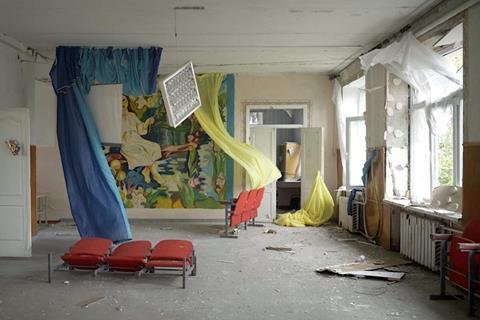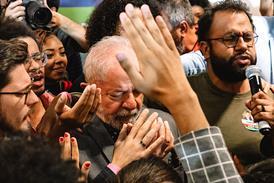Doc combines images of destruction in Ukraine with calls home by Russian soldiers to horrifying effect

Dir/scr: Oksana Karpovych. Canada/France/Ukraine. 2024. 93mins
The horrors of war — specifically Russia’s continuing invasion of Ukraine — are rendered in startling fashion in Intercepted, the second feature from Ukrainian-Canadian photographer and filmmaker Oksana Karpovych (Don’t Worry, The Doors Will Open). The documentary shows no combat or atrocities, but boldly juxtaposes static scenes of Ukrainian life with phone calls from Russian troops to their loved ones back home. This daring collision of image and sound is haunting in its own way, presenting intimate conversations which often reveal trace glimpses of humanity in soldiers who otherwise have behaved monstrously.
A film about watching and absorbing
Debuting in Berlin, Intercepted has played festivals including Thessaloniki and now Hot Docs, and is a worthy companion piece to Mstyslav Chernov’s 20 Days In Mariupol, which won Best Documentary at both the Baftas and the Oscars. But whereas that picture offered shocking footage of the invasion of the titular city as it was happening, Intercepted is a more cerebral experience — although that is not to suggest that Karpovych shortchanges the viewer’s emotional engagement. Strong reviews could lead to arthouse theatrical play.
Opening on-screen text informs us that Ukrainian special services monitored calls from Russian soldiers during the invasion, posting excerpts online. Karpovych, who was working as a producer with Al Jazeera English to cover the war, collects some of those excerpts, drawing from recordings made between March and November of 2022. That audio is supplemented with footage she filmed around the country – primarily, empty rooms that have been pulverised in the fighting. The unidentified soldiers speak with lovers, parents and friends, their conversations running the gamut from bragging about killings (“I shot everyone in the head and killed them. They cried and begged me, and I still shot them,” says one) to laments about the pointlessness of the conflict.
Don’t Worry, The Doors Will Open, which took home the 2019 New Visions Award at the Montreal International Documentary Festival, was an observational documentary that chronicled the activity on a Ukrainian train. Equally, Intercepted is a film about watching and absorbing. At just over 90 minutes, the documentary casts a spell through its minimalist construction, constantly inviting the viewer to scrutinise the phone calls while taking in the aftermath of the destruction meted out by Russian forces.
No war scenes are included, but we do see bombed-out buildings, eerily quiet streets and even the occasional attempt at normalcy, such as people playing volleyball. Karpovych is suggesting that life goes on, despite the misery, but the use of intercepted phone calls personalises the aggressors in a fascinating manner, giving us a faceless but intimate cross-section of soldiers in their private moments.
Intercepted features a wide array of conversations, although many of the speakers have abhorrent views of Ukranians, dismissing them with ethnic slurs, and are eager to annihilate them. Some have other views, though, including one soldier fearful that his commanding officers are sending his squad into a death trap. But whether the intercepted call focuses on how the Russians torture their prisoners or the disturbed reaction to seeing rotting corpses, Karpovych’s unadorned presentation makes those voices seem both mundane and insidious. Few of these speakers come across as particularly insightful or intriguing — the calls are frequently generic chit chat — and yet, the content of those unremarkable conversations is chilling. Juxtaposed with images of devastation and desolation, the calls remind us that ordinary individuals carried out these terrible acts.
The film’s sound design adds to the discomfort, the faint crackle of gunfire (or is that construction?) sometimes rippling in the distance. Ukrainian electronic musician NFNR crafts a score that grows more anxious as Intercepted reaches its conclusion, hinting at an angry moral reckoning that might be just around the corner. Karpovych allows brief whimsical moments, such as images of livestock resting comfortably in the mud, but these have to share space with silent shots of mass graves. Ukrainians do appear in some scenes, but their backs are usually turned to the camera as they try to clean up their homes or wait for assistance at a local church.
Intercepted creates power out of absence, which is why one survivor’s words hit so hard. She looks at the camera and says, “Thank you for not forgetting us.” Karpovych is there to bear witness.
Production companies: Les Films Cosmos, Hutong Productions, Moon Man
International sales: Lightdox, bojana@lightdox.com
Producers: Rocio Barba Fuentes, Giacomo Nudi, Pauline Tran Van Lieu, Lucie Rego, Darya Bassel, Olha Beskhmelnytsina
Cinematography: Christopher Nunn
Editing: Charlotte Tourres
Music: NFNR





















